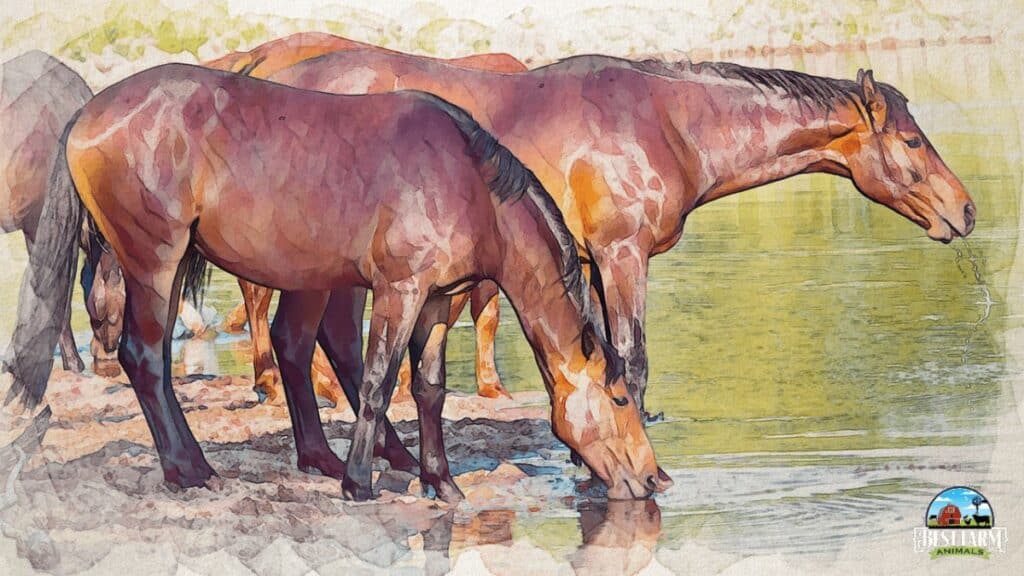Walking past the stables one afternoon, I noticed Missy, one of our older mares, lying down in her stable, looking quite unhappy. Without even waiting to check for heave lines on her sides, I know that she’s got colic. The cause? Because she’s an old horse, she doesn’t drink enough water.
- Horse Owners Often Forget to Monitor Water Intake
- 11 Reasons Horse Hydration Varies Between Horses
- 1. Horses Drink Less Water In The Winter (And Why That’s a Concern)
- 2. Summer: How Much Water Will A Horse Drink in Hot Weather?
- 3. Old Horse Not Drinking Water
- 4. Horse Breeds Have Individual Water Needs
- 5. Increased Work Can Increase Water Intake
- 7. Horses Drink More in Hot Weather
- 8. Do Horses Need Water at Night?
- 10. Colicky Horse Not Drinking Water
- 11. Pregnant and Lactating Mares Need More Water
- What is the Fastest Way to Hydrate a Horse?
- Signs to Check If A Horse Is Dehydrated
- Horse Hydration FAQs
- Conclusion
You’d think that a horse would know how much water to drink, but it’s not that simple. And, getting a horse to drink when it doesn’t want to is an almost impossible feat.
So, how much water does a horse drink a day? The average horse requires 5-10 gallons of fresh drinking water per day to remain hydrated. Exactly how much your horse will drink depends on their age, breed, level of work, and weather. Pregnant and lactating mares drink more water, while foals and older horses won’t drink as much.
Understanding why horse hydration is critical to your horse’s health. Let’s dive in!
Horse Owners Often Forget to Monitor Water Intake
Most horse owners are careful to monitor how much food their horse eats in a day but are often less cautious about water consumption. After all, how do you check how much water your horse has drunk for the day? This is almost impossible if your horse shares their paddock with other horses or animals that share its water container or trough.
If your horse is stabled at night, you may have a clearer indication of their nightly water consumption. Yet, not all horses drink an appropriate amount of water at night. Some horses are picky about drinking from a water bucket or a trough. They may prefer drinking from their stable bucket (seeming to drink a lot for the night) or drinking out in their paddock and not in the stable (which may falsely convince you they are not drinking enough water).
The best is to look at the factors that could influence your horse’s daily water consumption and learn to monitor for signs of dehydration in your horse.
11 Reasons Horse Hydration Varies Between Horses
Several factors may be influencing your horse’s daily water consumption. While you can’t control all of them, you can take note and help your horse drink more if needed.
How often do horses drink water? Horses require access to water 24 hours a day and will drink 5-10 gallons of water daily, depending on the horse’s age and health. Older horses tend not to drink as much water, while young horses drink more. Water is needed for proper digestion and to avoid a sticky gut. A horse may sip water all day or drink a whole bucket in one go.
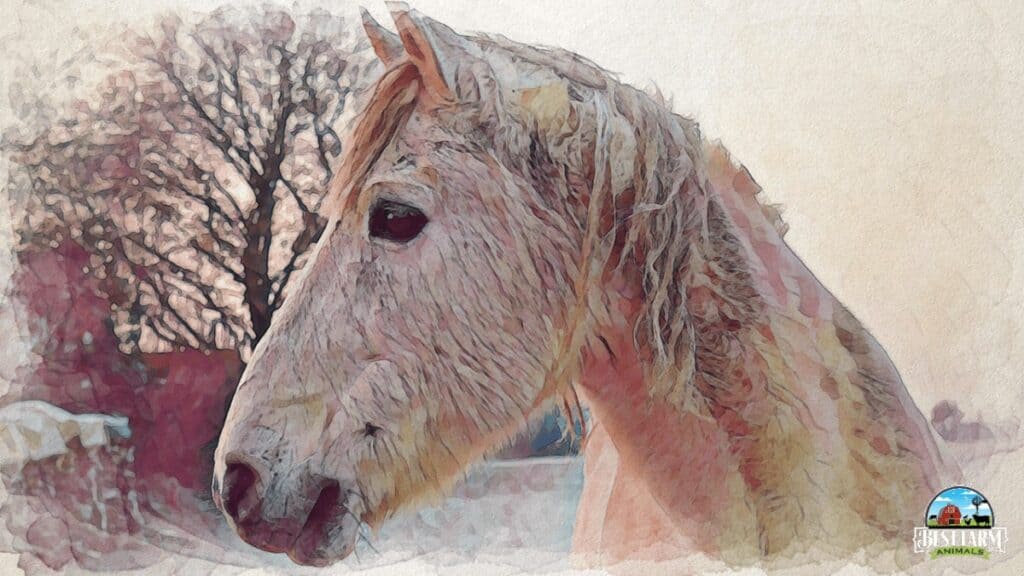
1. Horses Drink Less Water In The Winter (And Why That’s a Concern)
The weather has a significant impact on your horse’s water intake. On cold days, your horse will drink less water. That’s because they sweat and lose less water through physical activity. Warm days have the opposite effect. Sweaty horses are more thirsty, drinking more water.
Another factor that can impact how much water your horse drinks on cold days is the temperature. When water is too cold or hot, horses are less inclined to drink it. A horse prefers water that is 45-65 ℉. This can be a problem in winter if your horse’s water trough freezes. A horse can easily colic from icy water. They may also refuse to drink freezing cold water. Even warmer water higher than 65 ℉ may be unpalatable to your horse, causing them to reject the water.
Getting Your Horse to Drink More Water in the Winter
One of the reasons why horses drink less water in winter is the water temperature. Cold or freezing water shocks their guts, so horses refrain from drinking when the water is too cold or frozen. Adding a water heater to your water supply will help your horse drink more water. Placing water in a walk-in shelter can help keep it from freezing in their paddock.
How much water can a horse drink a day in winter?
A horse requires the same volume of water all year round, and while they drink less water in winter, it would still be best for them to drink the same as in summer. Horses always need to drink at least five gallons of water per day, but 10 gallons is best.
How long can horses go without water in the winter? A horse can survive 20-25 days without food, but they can dehydrate much faster, and even though it’s not hot in winter, a horse can still suffer dehydration and death within 24 to 48 hours. Once their gut dehydrates, it becomes sticky and will not be able to pass food along, which will lead to choke.
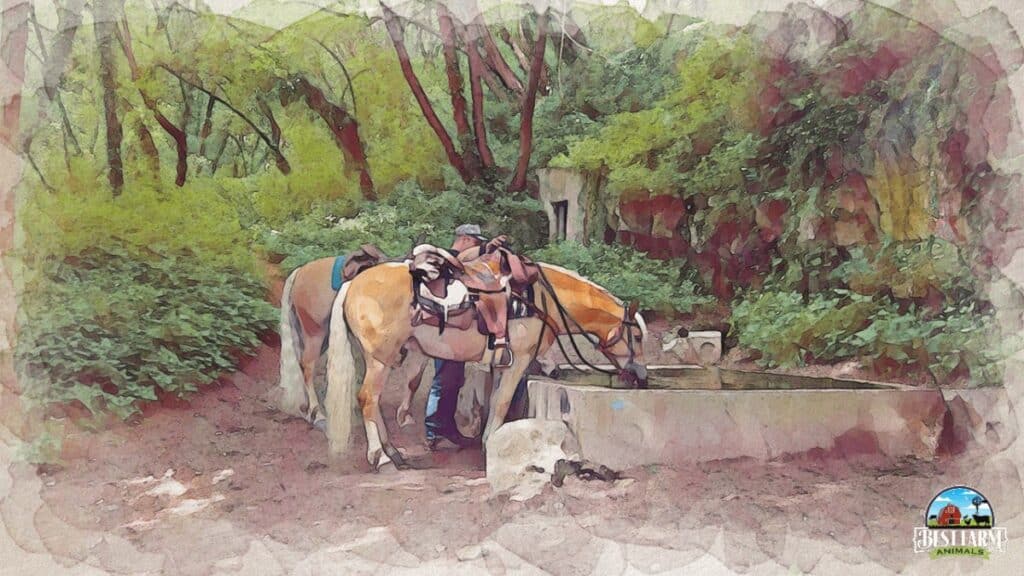
2. Summer: How Much Water Will A Horse Drink in Hot Weather?
A horse will drink 5-10 gallons of water when it’s hot in summer. During hot days, a horse can lose as much as 2-4 gallons of water from their body per hour in the form of sweat if they exercise hard. This is why it’s essential to feed your horse an electrolyte replacement such as salt with their water to ensure they replace the minerals lost during sweating.
Should you put ice in your horse’s water? You can place ice in your horse’s water bucket but don’t overdo it. A hot and sweaty horse that suddenly drinks ice-cold water can have a heart attack or suffer brain damage. It’s best to add a little ice to cool the water, but not so much that the water becomes cold.
Severe wind can also cause a horse to drink less water, but it can pull water from their bodies. They may stand with their tail to the wind. They will drink less if their water becomes muddy or dirty with flying debris like sand, leaves, or other particles. I always use the rule that if I don’t want to drink out of my horse’s trough, I can’t expect them to drink from it either.
3. Old Horse Not Drinking Water
Older horses often slow down the amount of water they drink. While, Young horses are naturally quite attuned to drinking, older horses may lose the habit. With age, horses suffer physical decline. One thing that declines first is their teeth, which lowers the roughage they eat.
This means older horses are less motivated to drink water because hay makes horses thirsty.
My young horse loves taking her hay, soaking it, and drinking a hay-water slop. But, my older mare will eat her hay delicately and only drink when she is really thirsty. This demonstrates how older horses often have a lower water intake than younger ones do.
As a result of age-related wear and tear, older horses often have compromised digestive tracts. This makes them more vulnerable to dehydration. Since they don’t drink as much water as younger horses, older horses often suffer more acutely the effects of being without water.
4. Horse Breeds Have Individual Water Needs
Different breeds of horses tend to have their own water requirements. Some horses, like Arabian horses, will require less water. That’s because of their lighter weight. Heavier horses need more water daily.
Therefore, a Shire or a Clydesdale will need much more drinking water than a Welsh cob would.
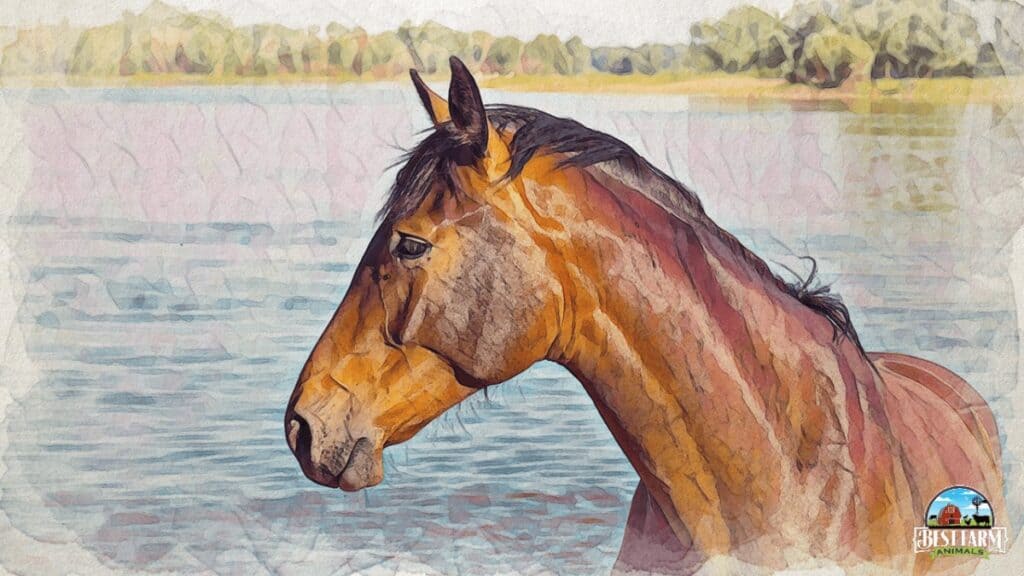
5. Increased Work Can Increase Water Intake
A horse that peacefully grazes all day will probably require far less than a horse that does a lot of work each day. Endurance horses need much more water while they are in training than non-active horses.
Physical activity induces sweating, which means your horse is busy dehydrating. When a horse is physically active, it will also have a faster digestive system. This means they will require more water to keep up with their nutritional needs.
6. Forage vs. Hay: The Impact on Water Needs
When your horse is eating natural grazing, they will be ingesting some moisture with the grass and legume sap that they eat. Hay, on the other hand, is a much drier feed.
A horse that stands in a paddock with short grazing and a hay net to munch on will require more water. Natural forage is juicier, while hay is drier, so be sure to give your horse access to water and a salt lick if they are on hay 24/7.
Horses cannot get enough water from grass. Grass can provide a horse with some basic hydration because of the sap that can be found in the leaves. However, if you milk a whole acre of grass for their juices, you’ll still not get to 5 – 10 gallons. That’s why it’s so important to provide water to your horse.
7. Horses Drink More in Hot Weather
I often see horses in their paddocks at noon with no water. If your horse doesn’t have access to a self-filling water trough or ample water supply, check on their water at least thrice daily. This will ensure your horse always has access to water.
There will be times of the day when your horse needs more water, such as noon or late afternoon. Be sure they have access to fresh water at ALL times. Never assume your horse doesn’t need more water, even if it has gulped down 10 gallons recently. A medical condition and specific instructions from a vet are an exception.
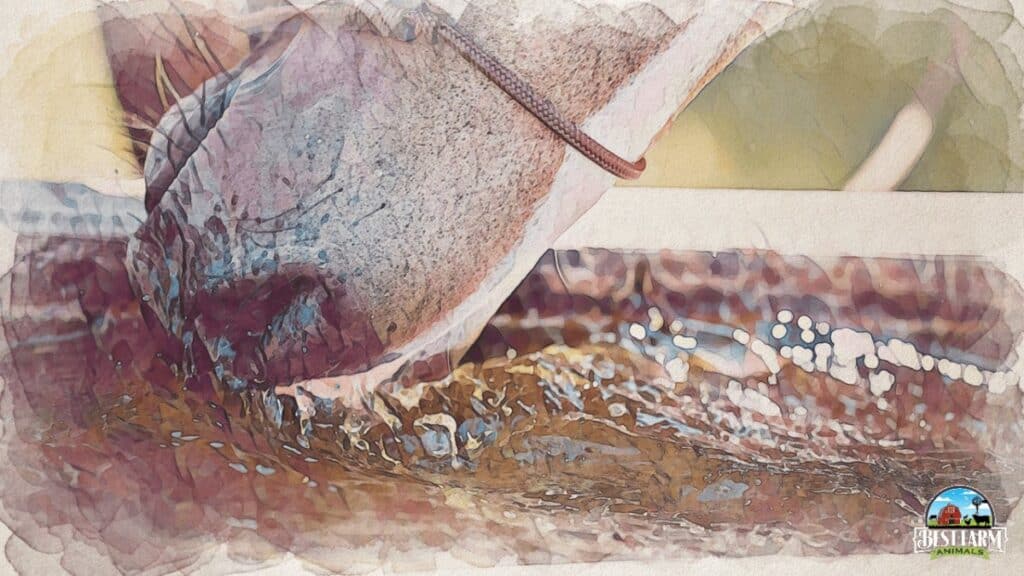
8. Do Horses Need Water at Night?
Horses need water 24 hours a day. Many horses don’t like drinking water in their stable during the night, which can create problems for their digestion and hydration levels. A horse may choose not to drink water during the night, but this isn’t to say that it’s ideal to let them dehydrate during the night.
My gelding tends to avoid drinking water at night. It’s a real cause for concern, and I’ve had to look at ways to trick him into drinking more water, but more on that later.
Can a horse go all night without water? Each owner needs to decide whether they are happy for their horse to dehydrate for 10-16 hours a day when they face a dry stable at night. I know I’m not. Horses can’t eat as much hay during the night when they don’t have enough water, which can cause stomach ulcers as the stomach’s acidity increases.
9. Electrolyte Balance Helps With Water Retention
Any human athlete will tell you that exercise strips the body of water. It also removes valuable electrolytes and minerals from the body. When electrolyte levels drop, muscles begin cramping.
The worst part about electrolyte loss is that thirst stops, even though you really should drink more water. The same thing happens to horses.
Horses also experience mineral and electrolyte loss when they sweat a lot from exercise or heat. This results in an upset of their salt balance. As a result, when the horse should be drinking more water, they consume less because they don’t feel thirsty.
Knowledgeable horse owners place salt licks in their horses’ paddocks and stables to counter this. This helps the horse become thirsty again, and they will drink more water. If you choose to add a salt lick to your horse’s paddock or stable, take care only to add a suitable and safe one for horses.
Don’t ever use mineral or salt licks for other animals. Cattle licks contain urea, which is harmful to horses and can lead to kidney failure. I also recommend avoiding molasses-based licks as these are sweet and may cause your horse to eat more of the lick than their body needs (which can damage their kidneys).
I like these electrolytes by Finish Line Horse Products Apple A Day. It’s free of fillers and sugars that can lead to kidney problems, focusing on offering the best minerals and natural vitamins to help replenish and hydrate a horse in medium to hard work. My barn is never without it in summer; even in winter, it’s a neat trick to get oldies to drink more.
10. Colicky Horse Not Drinking Water
When a horse is colic prone, they may not drink enough water, which worsens the problem as a horse with dehydration is sure to develop a sticky gut that won’t pass stool as normal. To help a horse that’s colicky drink more, you can try any of these methods:
- Sweeten their drinking water with apple juice.
- Add water to their feed, making a soft gruel mix with their sweet feed and water.
- Add beet pulp to their food with loads of water, soaking it well until the food is wet and bulked as the horse will gain a large volume of water with their feed.
- Soak or steam hay to encourage the hay to absorb moisture and also help lubricate the gut.
11. Pregnant and Lactating Mares Need More Water
Individual horses may have specific needs for more water. For example, a mare that is lactating and nursing her foal will also require much more water. She will be dehydrating much quicker while she nurses and produces milk. Pregnant mares will also need more water as both she and the growing foal need it.
But, other specific health conditions may mean your horse needs extra water. Be sure to follow your vet’s recommendations if that comes up.
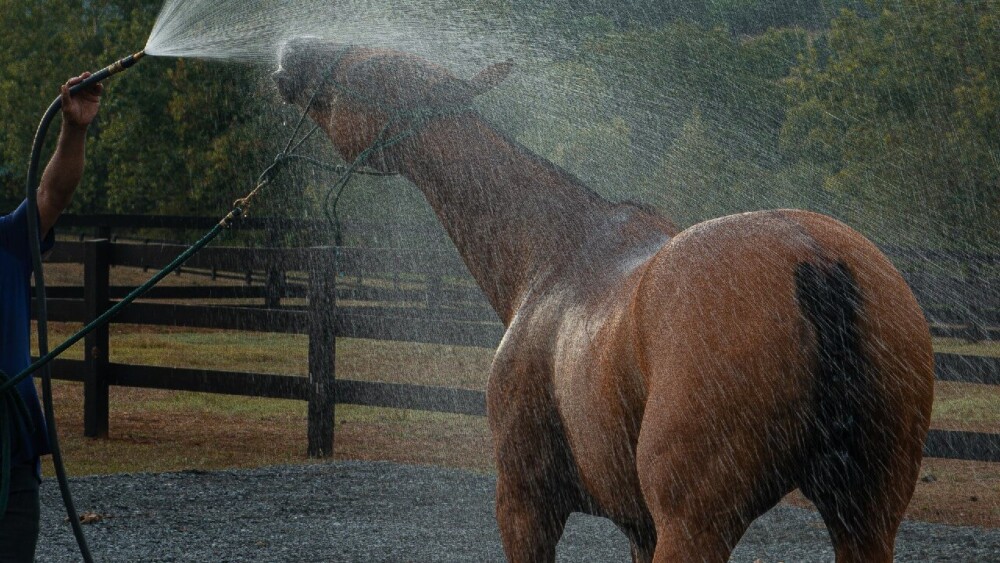
What is the Fastest Way to Hydrate a Horse?
If your horse is becoming severely dehydrated, you should contact a vet to come and rehydrate your horse with an IV fluid unit. However, a horse that has moderate dehydration can benefit from the following ways to hydrate a horse quickly. Keep in mind it takes a while to rehydrate a horse.
- Move the horse to a cool space out of the sun so they don’t lose more water due to sweat or heat.
- Add electrolytes to their water, feed a soupy meal mixed with water
- Spray your horse with water from a hose the horse if they are still hot and sweaty.
- Feed other water sources such as grated carrots, cucumber, apples, and some apple juice.
Horse Hydration Concerns Table
| Lower Chances of Dehydration | Increased Chances of Dehydration |
| Grazes on Green pasture | Feeds on Dry Hay |
| Free Access to Water | Limited Access to Water |
| Multiple Waterers Available | Many Horses Per Waterer |
| Healthy Horse | Pregnant or Lactating Horse |
| Water Temperature 46-65 degrees F. | Too Hot, Too Cold, or Frozen Water |
| Stabled Horse | Heavy Work Day |
Signs to Check If A Horse Is Dehydrated
If you suspect your horse is dehydrated, you need to check them to decide how dehydrated they are and if you need a vet to come and administer treatment. Dehydration is not always evident by how much or little your horse has sweated or if they are breathing fast or not. Instead, you can carefully check for the following signs in your horse that they are dehydrated.
Pinch or Snap Test
When dehydrated, your horse will lose water from its skin first, which is why the snap test is so accurate. It’s pretty easy to administer:
With the horse standing with its neck straight, take a soft pinch grip on the skin of its neck. Pinch the skin together, hold it for a second or two, then release and watch the site where you pinched. If the skin snaps back into place, your horse is not dehydrated. If you release the pinch only to have the folded skin show for several seconds, then your horse is dehydrated.
Mucus Membranes Sheen
You can also check the mucus membranes. They are found inside the mouth and the eyes. A badly dehydrated horse will start to have a dry mouth, and their lips will hang limply or stick to their mouth.
If you press on their gums and it stays white for more than 2 seconds, your horse is dehydrated. They will have dry and red eyes, and you will quickly notice the “light go out” as their eyes lose sheen from drying out.
Lack of Appetite
A dehydrated horse will have no appetite. Since its mouth is dry, it won’t want to eat either. Instead of grazing, it will simply stand listlessly in its paddock. If you offer your horse concentrated or sweet feed, it may show no interest or may nibble at the food with little natural appetite.
Dry Stool Quality
If the dehydration is long-term, you will notice your horse’s stool becomes dry, and they may struggle to pass stool. The ball-shapes of the fecal matter may also be dried out as soon as your horse has a bowel movement. Natural horse stool is usually softballs that are slightly shiny.
Dark Color of Urine
An extremely dehydrated horse will not urinate much, though there may be a drippy discharge from a mare if she is severely dehydrated. If your horse is still passing stale, you may find their urine is dark brownish-yellow, which indicates the imbalance of electrolytes to water.
Disoriented Behavior
When dehydration is severe, your horse may become disoriented. They may walk into things. Their gait may be stumbly. Or, they may stand still with their head hanging low. These all point to a complete drop in energy levels and listlessness.
Blood Pressure and Other Vital Signs
Having assisted several vets with severely dehydrated horses, I know that one of the top signs (and problems) with a dehydrated horse is their loss of blood pressure. This makes it hard to find a vein for intravenous injection or to insert an IV or drip.
You will also notice a drop in heart rate, and respiration will soon become a threat, and your horse may gasp often. If you see these signs in your horse, you need to get a vet out ASAP!
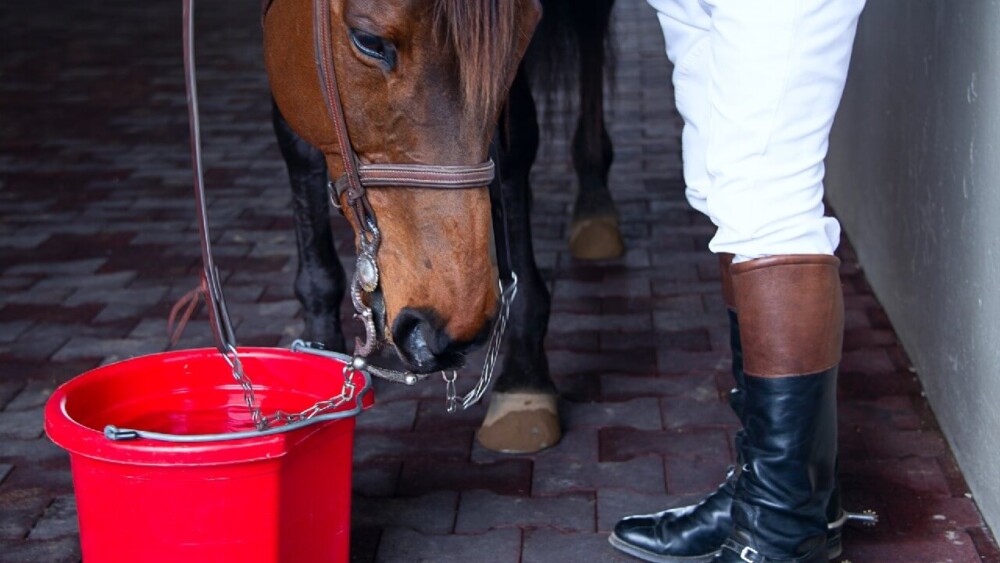
Horse Hydration FAQs
Can horses go 5 hours without water? Horses can survive five hours without water, depending on the amount of exercise the horse is expected to perform. A healthy horse shouldn’t be dehydrated within five hours of not having water, but a horse should always have free access to clean water. Some medical procedures may require withholding food and water for short periods.
Can horses go 8 hours without water? A horse will start showing severe signs of dehydration if they are without water for eight hours. Their skin will begin to lose elasticity and the snap test will point to them being dehydrated. When a horse is without water for 8 hours, their gut health becomes compromised and they may suffer colic or choke if fed.
How much water does a horse drink per day in liters? A horse requires 5 – 10 gallons or 19-38 liters of water per day. Horses in heavy work may require much more, and a horse that consumes large volumes of water should also have access to electrolytes such as salt in their feed or a salt lick to help balance their water intake and ensure correct hydration.
How much water does a young horse need per day? A very young horse, such as a foal that’s still nursing, may require somewhat less water, but it’s good practice to ensure they have access to the same amount of water as an adult horse (5-10 gallons). Foals that are still nursing get their water intake from their mother’s milk, but they do drink extra water too.
Can my horse drink too much water? Some medical diseases, such as Cushing’s disease, can cause your horse to drink too much water, and they may also drink more water at once than other horses do. A horse shouldn’t walk into their stable and drink a whole 10-gallon bucket of water unless they have been dehydrated or if the weather is sweltering. On a hot day, horses can sometimes drink as much as 15 gallons of water a day.
If your horse drinks large volumes of water in one session, you may have a case of polydipsia or excessive drinking, which will, in turn, cause polyuria or excessive urinating.
My Favorite Equine Resources For Horses and Donkeys
This list contains affiliate products. Affiliate products do not cost more but helps to support BestFarmAnimals and our goal to provide farm animal owners with accurate and helpful information.
Squeaky Chicken Toy is hilarious to watch and the horses love it! It’s not super tough so keep it away from dogs.
Dewormer with Ivermectin: I use this for my horses and my goats. Duvet makes a great dewormer. I switch between the Ivermectin one and one like this one so the worms don’t get immune to it.
Manna Pro Apple Flavored Nuggets are a delicious smelling treat that my horses go crazy over.
Equinity Amino Acid Supplement for Horses makes a big difference for any horse that’s struggling with arthritis, hoof issues, or just generally. It’s great for older horses who can’t absorb all the nutrients in their food as well!
Manna Pro Weight Accelerator helps older horses gain weight and stay healthier! This was especially helpful when one of my older horses lost weight over the winter and helped her regain her weight over the summer!
Farnam Fly Control goes on the horse or donkey and will keep the flies off your sweet pet. It makes horses way more comfortable and will keep sores from getting infected as well.
Wound Kote protects sores and wounds. It acts as an antiseptic and helps wounds heal faster. It works on both my horses and goats.
Conclusion
Dehydration can lead to long term issues with a horse that is frequently not at the levels of hydration their body requires. It’s not always as simple as filling up their water bucket and expecting them to drink enough water. Sometimes you need to help your horse along with careful monitoring of their water intake, addition of salt to their feed to stimulate the thirst instinct, and even get creative with ways to help them drink more water.
If you have a horse prone to not drinking enough water, you can read our guide on making a dehydrated horse drink more water.

